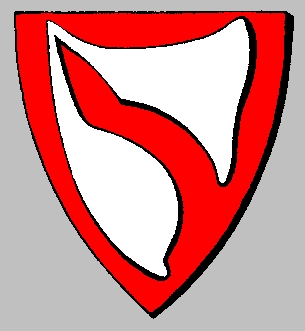John PROWSE [Parents] [scrapbook] 1, 2, 3, 4, 5 was born 6 about 1377 in of Chagford, Devonshire, England, United Kingdom. John married 7, 8 Agnes BAMPFIELD 9, 10, 11, 12, 13 in 1406 in of Chagford, Devonshire, England, United Kingdom.
| |
John PROWSE [Parents] [scrapbook] 1, 2, 3, 4, 5 was born 6 about 1377 in of Chagford, Devonshire, England, United Kingdom. John married 7, 8 Agnes BAMPFIELD 9, 10, 11, 12, 13 in 1406 in of Chagford, Devonshire, England, United Kingdom. |
Agnes BAMPFIELD [Parents] 1, 2, 3, 4, 5 was born in 1377 in Chagford, Devonport, Devon, England, United Kingdom. Agnes married 6, 7 John PROWSE 8, 9, 10, 11, 12 in 1406 in of Chagford, Devonshire, England, United Kingdom. |
They had the following children.
M i Richard PROWSE was born about 1407.
| |
John PROWSE [Parents] [scrapbook] 1 was born about 1352 in Chagford, Devonshire, England, United Kingdom. John married Matilda (Maud) CREWES 2. |
Matilda (Maud) CREWES 1 was born about 1355 in Chagford, Devonshire, England, United Kingdom. Matilda married John PROWSE 2. |
They had the following children.
M i John PROWSE was born about 1377.
Thomas BAMPFIELD [Parents] 1, 2, 3, 4 was born 5 about 1345 in of Poltimore, Devon, England, United Kingdom. He died after 1392. Thomas married 6 Agnes COPLESTONE 7, 8, 9, 10 about 1376. |
Agnes COPLESTONE 1, 2, 3, 4. Agnes married 5 Thomas BAMPFIELD about 1376. |
They had the following children.
F i Agnes BAMPFIELD was born in 1377.
John BAMPFIELD III [Parents] 1, 2, 3, 4 was born about 1319 in Poltimore &, Huxham, Devon, England, United Kingdom. He died 5, 6 in BY 1362. John married Joan GILBERT 7, 8, 9. |
Joan GILBERT 1, 2, 3 was born about 1323. Joan married John BAMPFIELD III 4, 5, 6, 7. |
They had the following children.
M i Thomas BAMPFIELD was born about 1345. He died after 1392.
John BAMPFIELD II [Parents] 1, 2, 3, 4 was born about 1297 in Poltimore, Devon, England, United Kingdom. John married Isabel COBHAM 5, 6, 7, 8. |
Isabel COBHAM 1, 2, 3, 4 was born about 1284 in Devon, England, United Kingdom. Isabel married John BAMPFIELD II 5, 6, 7, 8. |
They had the following children.
M i John BAMPFIELD III was born about 1319. He died in BY 1362.
John BAMPFIELD 1, 2, 3 was born about 1258 in Devon, England, United Kingdom. John married 4, 5 Eleanor BEAUCHAMP 6, 7, 8, 9 in 1292. |
 |
Eleanor BEAUCHAMP [Parents] [scrapbook] 1, 2, 3, 4 was born 5 about 1275. Eleanor married 6, 7 John BAMPFIELD 8, 9, 10 in 1292. |
They had the following children.
M i John BAMPFIELD II was born about 1297.
| |
Sir Humphrey de BEAUCHAMP Knight [Parents] [scrapbook] 1, 2, 3, 4, 5, 6 was born 7, 8 about Mar 1253 in Ryme Intrinseca, Dorset, England, United Kingdom. He died 9, 10 about Feb 1316/1317. Humphrey married 11 Sybil OLIVER 12, 13. |
Sybil OLIVER 1, 2. Sybil married 3 Sir Humphrey de BEAUCHAMP Knight. |
They had the following children.
F i Eleanor BEAUCHAMP was born about 1275.
| |
Robert de BEAUCHAMP IV Baron of Hatch [scrapbook] 1, 2, 3, 4 was born before 1231 in of Hatch, Somersetshire, England, United Kingdom. He died on 22 Sep 1281. Robert married 5, 6 Alice de MOHUN 7, 8 about 1245/1246. |
Alice de MOHUN [Parents] 1, 2 was born about 1230 in of Dunster, Somersetshire, England, United Kingdom. She died 3, 4 about 1284. Alice married 5, 6 Robert de BEAUCHAMP IV Baron of Hatch 7, 8, 9, 10 about 1245/1246. |
They had the following children.
M i Sir Humphrey de BEAUCHAMP Knight was born about Mar 1253. He died about Feb 1316/1317.
 |
Sir Reynold de MOHUN II [Parents] [scrapbook] 1, 2 was born 3 about 1206 in of Dunster, Somersetshire, England, United Kingdom. He died 4, 5, 6, 7 on 20 Jan 1257/1258 in Torre Mohun, Devonshire, England, United Kingdom. He was buried 8 in 1257 in Priory Church, Newenham, Devonshire, England, United Kingdom. Reynold married 9, 10 Hawise Fitz GEOFFREY 11, 12, 13 about 1227. Other marriages:FERRERS, Isabel |
Hawise Fitz GEOFFREY [Parents] 1, 2, 3 was born about 1210 in of Walden, Essex, England, United Kingdom. She died 4 about 1247. Hawise married 5, 6 Sir Reynold de MOHUN II about 1227. |
They had the following children.
F i Alice de MOHUN was born about 1230. She died about 1284.
Reynold de MOHUN was born in 1183 in Dunster, Somerset, England, United Kingdom. He died 1 in 1213 in Dunster, Somerset, England, United Kingdom. Reynold married Alice BRIWERE 2. |
Alice BRIWERE 1 died after 1233. Alice married Reynold de MOHUN. |
They had the following children.
M i Sir Reynold de MOHUN II was born about 1206. He died on 20 Jan 1257/1258.